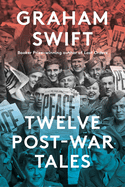
Booker Prize-winner Graham Swift (Mothering Sunday) makes history personal in the stunning Twelve Post-War Tales, a collection of stories about the consequences of pivotal memories. Epiphany and nostalgia permeate the slices of life that delineate characters in crisis enduring loss, grief, and emotional regeneration. Every story (a half dozen previously published) is a keeper, but several stand out. In the Kafka-like opener, "The Next Best Thing," a German bureaucrat in 1959 officiously dismisses a 19-year-old Jewish private in the British Army seeking information about missing relatives, recalling how they've all been lucky ones. A widowed 72-year-old retired respiratory specialist driving "between heaven and hell" while volunteering during the Covid-19 pandemic in "Blushes" has a "gush of memory" of having had scarlet fever on his 10th birthday. In "Chocolate," one of four geriatric friends sheltering from the "cold dank darkness" in a Kilburn pub reminisces about a flirtatious encounter in the 1970s with a woman who worked in a chocolate factory in York.
In "Beauty," the perplexing anguish of a double grief pursues a 68-year-old grandfather visiting a college dorm room where his 18-year-old granddaughter, who had an "unmissable" resemblance to his late wife, overdosed. The closing story, "Passport," is the most startling and revelatory. A once-orphaned octogenarian seeks the document "clutching the proof of her identity" and reconstructs her past. Twelve Post-War Tales underscores Graham Swift's supple prose, crisp dialogue, and brisk narration, challenging readers to investigate their own primary lifemarks. --Robert Allen Papinchak, freelance book critic

